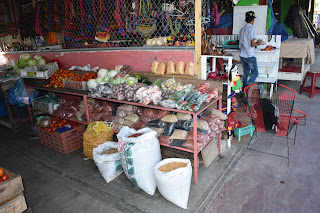 Group 3, made up of Britton, Erin, and myself, set out to create a nutritiously balanced meal from the ingredients in the market. We were given a $10 Belizean Dollar budget (the conversion rate to US dollars is 2 to 1). Our group originally planned to create a hypothetical meal and determine the prices for the ingredients. For example, I wanted to know the price difference for beans versus eggs in order to decide what our protein would be. Of course, these prices depend on the variety of beans and the eggs.
Group 3, made up of Britton, Erin, and myself, set out to create a nutritiously balanced meal from the ingredients in the market. We were given a $10 Belizean Dollar budget (the conversion rate to US dollars is 2 to 1). Our group originally planned to create a hypothetical meal and determine the prices for the ingredients. For example, I wanted to know the price difference for beans versus eggs in order to decide what our protein would be. Of course, these prices depend on the variety of beans and the eggs.After trying to plan an American inspired meal without much success, I decided to ask one of the vendors what might be a local Mayan dish that would meet our nutritional needs. A conversation began between the vendor (Daniella), the students (Britton, Erin, and myself), and a lovely customer willing to share. She explained to us the recipe for Caldo which is a local soup that includes chicken, onions, cilantro, lime, jalapeños, and corn flour for homemade tortillas. With every ingredient listed, there was more and more knowledge that came with it.
 In Belize, they have “Local” chicken and “Normal” chicken. Local chicken are raised traditionally, allowed to roam free. Whereas normal chicken are raised by Mennonites with more modern techniques like in the United States. The quality between these two are very distinct. The price for local chicken eggs in the market is $12 per tray, whereas normal eggs are $7 per tray (all Belizean currency). Our group began talking with a local customer and she explained to us that even though the local eggs are higher quality, she still buys the normal eggs because they are cheaper. However, on special occasions such as Christmas, she will pay the extra price to cook for the extended family.
In Belize, they have “Local” chicken and “Normal” chicken. Local chicken are raised traditionally, allowed to roam free. Whereas normal chicken are raised by Mennonites with more modern techniques like in the United States. The quality between these two are very distinct. The price for local chicken eggs in the market is $12 per tray, whereas normal eggs are $7 per tray (all Belizean currency). Our group began talking with a local customer and she explained to us that even though the local eggs are higher quality, she still buys the normal eggs because they are cheaper. However, on special occasions such as Christmas, she will pay the extra price to cook for the extended family. Being able to have this type of interaction with the locals gave me access to information that I would never have thought to ask for. As an example of informal education, I was able to extract some indigenous knowledge from the brains of the locals that I might not have been able to learn in the classroom or on a farm tour. It was truly an enlightening experience.
Lex is a freshman majoring in BioRenewable Systems/Biological Engineering
No comments:
Post a Comment